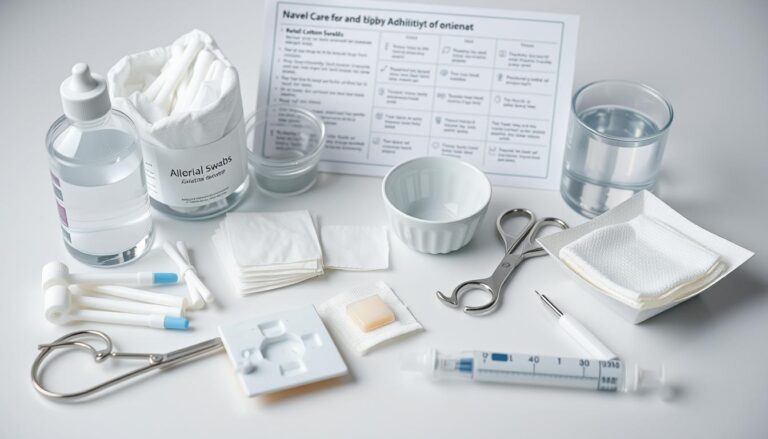Child Health Tips: Raising Happy, Healthy Kids

Discover essential child health tips to support your child’s well-being and happiness. Learn about healthy eating, regular exercise, establishing routines, and utilizing resources for raising well-rounded kids. Empower your parenting journey today
Table of Contents
Nurturing Self-Esteem and Positive Behavior
Building a child’s self-esteem is key, starting early2. It grows from infancy to adulthood2. Kids with high self-esteem do well in school and life2.
They feel loved, believe in themselves, and are more confident2. They make better choices and try again after failing2.
Boost Your Child’s Self-Esteem
Start by making your child feel loved and safe2. Every child develops self-esteem differently2. Praise their effort and let them learn from mistakes2.
Let them help, avoid criticism, and be a good role model2. Spend quality time and show love and support2.
Catch Kids Being Good
Use love, hugs, and compliments to encourage good behavior3. Kids with high self-esteem have better social skills and mental health3.
Research shows genuine praise boosts motivation and success3. Kids who enjoy their activities have higher self-esteem3.
Focus on strengths, not weaknesses, for more confidence and better behavior3. Healthy friendships and kindness increase self-esteem and well-being3.
Establishing Boundaries and Quality Time
Raising happy kids needs a balance. You must set clear rules and spend quality time together. Discipline helps kids learn self-control, but quality time strengthens your bond.
Set Limits and Be Consistent With Your Discipline
Setting boundaries and being consistent is key for your child’s growth. Lin struggled with giving phones to her kids without rules4. But, it’s never too late to set rules, no matter your child’s age4.
Good discipline teaches, not punishes. It builds a strong relationship and helps kids learn important skills4. When dealing with your child, ask if you respected their feelings and made your expectations clear4.
It’s better to use consequences that teach, like natural or logical ones4. For older kids, involving them in making consequences can teach accountability4.
Make Time for Your Kids
It’s also vital to spend quality time with your kids. Sharing meals, going on outings, or just being there makes them feel loved. This reduces misbehavior caused by seeking attention.
Limiting screen time is important, as the AAP and WHO suggest56. Kids aged 2 to 5 should have less than an hour of screen time daily5. Kids aged 5 to 17 need at least 60 minutes of physical activity daily5. Use tools or controls to manage their online access5.
By setting clear rules, being consistent, and spending time together, you create a supportive environment. This environment helps your child grow and strengthens your bond.
Modeling Positive Traits and Communication
As a parent, you shape your child’s behavior and communication skills. Children learn by watching and imitating their parents. By showing respect, kindness, and honesty, you teach your kids important values7.
Good communication is key. Explain rules, share feelings, and solve problems together. This teaches your child to think critically and shows they’re valued7. It also strengthens your bond8.
Be a Good Role Model
Your actions and attitudes deeply influence your child. Show them kindness, empathy, and responsibility. Admitting mistakes and solving problems teaches them valuable lessons9.
Keep a positive home by following rules and respecting others. Your child will learn to do the same, shaping their worldview9.
Make Communication a Priority
Good communication is essential for a strong relationship with your child. Have regular family talks and let your child have a say. This encourages teamwork and social skills9.
Speak positively and use “I” statements to guide conversations. Listen actively and reflect on what’s said. This helps your child follow directions and complete tasks better7.
Teach empathy by acknowledging feelings and discussing different views. This improves problem-solving and helps them interact positively7.
By showing positive traits and focusing on communication, you equip your child for success. They’ll build strong relationships and excel in school and socially798.
Adapting to Child’s Needs and Unconditional Love
As your child grows, it’s key to be flexible with your parenting style. Realizing that what works today might not tomorrow, and being ready to change, helps avoid frustration. It also ensures your child gets the support they need10.
Showing your child that your love is unconditional is vital, even when disciplining. Helping your child’s emotional intelligence grow and giving them a safe space to share feelings aids in their healthy development11.
Be Flexible and Willing to Adjust Your Parenting Style
- Know that your child’s needs and behaviors will change over time.
- Be ready to try new methods to find what works best.
- Change your discipline as your child grows and learns more self-control.
- Look for parenting resources and support to stay updated and motivated10.
Show That Your Love Is Unconditional
- Show your love and acceptance, even when they act out.
- Avoid using love or affection as a punishment or reward.
- Accept your child’s feelings and help them find good ways to deal with them.
- Keep a loving, caring relationship that makes your child feel safe11.
“The most important thing that parents can teach their children is to be loving, kind, and responsible human beings.” – Unknown
By adjusting your parenting style to your child’s changing needs and offering unconditional love, you help them grow emotionally strong. This strength is crucial for them to succeed in life1011.
Child Health Tips
Keeping your child healthy is a big job for parents. It’s important to make sure they get all their shots and watch their growth. This helps them have a happy and healthy life12.
Getting the right shots on time is key. Vaccines keep your child safe from serious diseases like measles and polio. They also help keep everyone in the community safe13.
Don’t forget to take your child to the doctor regularly. The doctor will check how tall and heavy they are. They’ll also check if they’re doing well physically and mentally14.
Teaching your child healthy habits is also important. A good diet, enough sleep, and exercise are all key. These habits help prevent problems like obesity and depression121314.
By being informed and active about your child’s health, you help them thrive. A healthy child is the start of a bright future.
| Recommendation | Benefits |
|---|---|
| Immunizations | Protect against serious and potentially life-threatening diseases |
| Regular Check-ups | Monitor growth, development, and overall well-being |
| Healthy Habits | Promote a balanced diet, adequate sleep, and physical activity |
“Healthy children are more likely to become healthy, productive adults who are better able to contribute to their communities.”
Promoting Healthy Habits
Starting healthy habits early is key for kids’ lifelong health. A balanced diet with fruits, veggies, whole grains, and lean proteins is essential. It helps build a strong body and mind15. Also, kids should get at least 60 minutes of physical activity daily. This can be through sports, outdoor play, or family activities, boosting their health15.
Start with Nutrition
Changing eating habits step by step is more likely to succeed15. Setting small, specific goals for the family is a good idea15. Writing down goals weekly and tracking daily progress helps stay on track with healthy habits15. Keeping a log of food and activity helps meet goals15.
- Aim for five servings of vegetables and fruit each day, gradually building up to this amount15.
- Opt for lower-fat substitutes in dairy, meats, salad dressings, mayonnaise, and desserts15.
- Limiting desserts to small portions and serving fruit with dessert is suggested15.
- Drinking water, skim, or 1% milk instead of high-calorie, sugary drinks is encouraged15.
Encourage Physical Activity
Getting kids into physical activities can spark a love for being active15. Limiting screen time to one to two hours a day is wise15. Encourage outdoor play with friends to boost physical activity15. Simple activities like taking the stairs or doing household chores can add physical activity to daily life15.
| Healthy Habit | Recommendation |
|---|---|
| Snacking | Children are advised to snack at least an hour away from a meal and have two to three snacks per day15. |
| Family Meals | Eating at least one meal together every day is recommended to promote family bonding and healthy eating habits15. |
| Screen Time | Limiting television, video games, or computer time to one to two hours a day is a recommended practice15. |
| Physical Activity | Varying physical activities for children and allowing them to choose their favorites is beneficial for sustained engagement15. Encouraging fun-based physical activities that everyone can participate in can be more enjoyable for all family members, including overweight children15. |
Remember, healthy habits are not just about nutrition and physical activity. It’s also about fostering a positive mindset, building resilience, and promoting overall well-being16. By involving the whole family and making small, sustainable changes, you can create a healthy and happy environment for your children to thrive16.
“Healthy habits are not just about what we eat or how much we move, but also about how we think and feel. By nurturing a positive mindset and building resilience, we can create a foundation for lifelong well-being.”
Establishing Routines and Support Systems
Keeping regular routines, especially for sleep, is key for a child’s health and happiness17. Bedtime and dinnertime routines help kids feel secure and in control17. It’s important to set regular sleep times and limit screen use before bed17. Also, learning to communicate well can make the parent-child bond stronger and help solve problems.
Promote Good Sleep Habits
Kids’ morning routines include waking up, getting dressed, brushing teeth, and eating breakfast18. Bedtime routines include bathing, wearing pajamas, brushing teeth, and reading18. Consistent sleep and meal times are crucial for a routine18. Giving kids free time in routines lets them be creative and independent18.
Learn How to Communicate
Routines help kids develop emotionally and socially in early childhood17. Regular routines at home teach kids to self-regulate, which is good for their mental health17. Rituals, like special family traditions, strengthen family bonds and help kids develop positively17. They also help families feel balanced and happy during tough times17.
Children need predictable attention from parents, with focused, positive interactions being more valuable17. Parents should share their worries openly to show kids how to handle stress17. Activities like Taco Tuesdays or Saturday movie nights can help families feel closer and emotionally strong17.
“Establishing new family rituals during times of change can create positive emotional connections and buffer the impact of stress on mental health.”17
Utilizing Available Resources
Raising kids is rewarding but tough. Parents don’t have to face it alone. There are many resources, both in the military and outside, that offer help and advice.
Programs like the New Parent Support Program and groups like the Boys & Girls Clubs of America are there to support kids’ growth19.
Take Advantage of Support
Experts like doctors and teachers work together to help kids grow19. Sharing info helps make decisions that support a child’s development19.
Free tools like the Ages & Stages articles and the CDC’s Milestone Tracker app help track a child’s progress19. Early help, like speech therapy, can start if needed19. Parents should look for help if they notice delays19.
It’s important for parents to celebrate and watch their child’s growth. They should share any worries with the support team19. Working together is key to helping a child grow19.
There are also many resources from government and non-profits that help families20. These cover topics like healthy eating and keeping kids safe.
The USDA has fun websites and games for kids to learn about food and exercise20. The CDC has tips and apps for healthy eating20. The FDA has materials to teach kids about reading food labels20.
By using all these resources, parents can get the help they need for their kids’ health and happiness192021.
Conclusion
Parents always put their children’s health and well-being first. By following the child health tips in this article, parents can help their kids become happy and healthy. This includes building self-esteem, setting boundaries, and showing positive behaviors22.
Creating a positive home environment is key for a child’s mental health22. It helps them grow emotionally strong and healthy. Being a parent has its ups and downs, but the joy of raising strong kids is worth it.
Feeding your child a balanced diet is crucial for their growth23. Make sure they get enough protein23, dairy or alternatives23, and whole grains23. Also, don’t forget about hydration and meal planning23.
Good sleep habits are also important22. They help your child stay well and avoid bad behavior22.
By using the parenting tips from this article, you can raise kids who are happy and healthy. The journey of being a parent is rewarding. With the right approach, your children will grow up confident, resilient, and well-rounded.
Click on the link below to read more about all things children’s health
https://www.mommyandwomb.com/health
FAQ
How can I boost my child’s self-esteem?
Praise your child’s small wins to make them feel proud. Focus on the good they do, not the bad. Use love, hugs, and compliments to encourage good behavior.
How should I discipline my child?
Set clear rules and stick to them to teach right from wrong. Spend quality time with your kids. This makes them feel loved and less likely to act out for attention.
How can I be a good role model for my child?
Show your kids what’s important by being respectful, kind, and honest. Talk to them often and explain rules. This teaches them to solve problems and value their opinions.
How can I adapt my parenting style as my child grows?
Change your parenting as your child’s needs evolve. Be open to new ways of parenting to avoid getting frustrated. Show your child you love them no matter what.
What are the key child health tips I should follow?
Make sure your child gets regular check-ups and shots. Watch their growth and encourage healthy eating and exercise. This keeps them healthy and happy.
How can I establish healthy routines for my child?
Stick to a bedtime and wake-up schedule. Limit screen time before bed. Good communication helps you connect and solve problems together.
What resources are available to help me as a parent?
There are many resources for parents, in the military and beyond. Programs like the New Parent Support Program and organizations like the Boys & Girls Clubs of America offer support. Use these resources to help your child succeed.
Essential Tips for New Baby Care and Feeding





